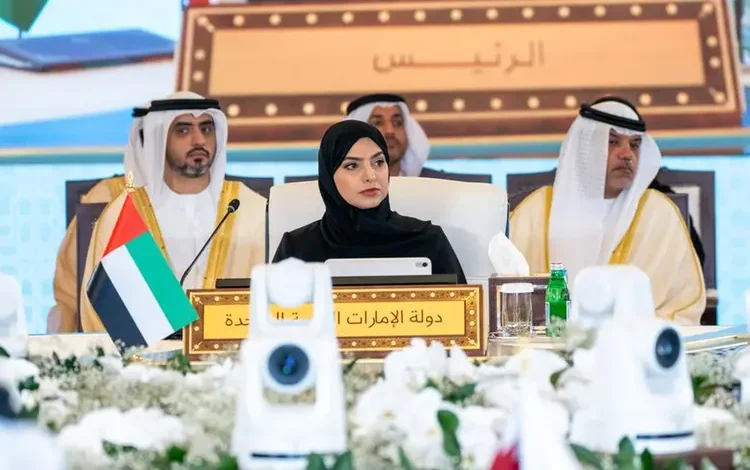
UAE’s Vision Aligns with GCC for Boosting Regional Food Security: Amna Al Dahak
In a landmark move, the UAE’s vision aligns with GCC countries to enhance regional food security, as highlighted by Dr. Amna bint Abdullah Al Dahak Al Shamsi. The Gulf Cooperation Council (GCC) countries are joining forces to tackle the pressing issue of food security in a region characterized by limited arable land and water scarcity. This collaboration marks a significant step towards creating a resilient food system that can withstand future challenges and ensure sustainable food supplies for the growing populations of GCC nations.
The UAE’s food security strategy, in harmony with its GCC counterparts, focuses on innovative solutions and sustainable practices to overcome agricultural challenges. From cutting-edge aquaculture techniques to the adoption of modern agriculture technologies, the UAE is leading the charge in transforming the regional food landscape. This article explores the key highlights from the recent GCC Ministerial Meeting, delves into the UAE’s vision for regional food security, and examines the collaborative efforts and shared challenges faced by GCC countries in their quest to build a more food-secure future.
GCC Ministerial Meeting Highlights
The 160th session of the GCC Ministerial Council convened in Doha on June 9, 2024, chaired by His Excellency Shaikh Mohammed bin Abdulrahman bin Jassim Al Thani. The meeting brought together foreign ministers from member states, including the UAE, Bahrain, Saudi Arabia, Oman, Kuwait, and the GCC Secretary General. The council welcomed the outcomes of the Zero Neutrality Forum for Producers, praising member states’ efforts in carbon and methane emissions reduction. They also addressed regional concerns, condemning Iran’s actions on the occupied Emirati islands and its military maneuvers in the area. The council emphasized the need to cease such provocative actions that threaten regional security and international navigation in the Arabian Gulf.
UAE’s Vision for Regional Food Security
The UAE has developed a comprehensive National Food Security Strategy to address the challenges of food security in the region. This strategy aims to boost home-grown food production by 30% to 40% within a decade and transform the UAE into a world-leading hub of innovation-driven food security by 2051. The government has set an ambitious target of producing 50% of the food consumed locally by 2051, up from 20% in 2022.
To achieve these goals, the UAE is focusing on innovative AgriTech solutions. These include vertical farming, a type of Controlled-Environment Agriculture (CEA) that uses soilless methods like hydroponics and aquaponics. These techniques use 95% less water than traditional farming methods, addressing the region’s water scarcity issues. The country is also exploring other AgriTech solutions, such as precision agriculture and alternative resources like solar power for agriculture.
The UAE’s commitment to food security is evident in the appointment of a Minister of State for Food and Water Security, tasked with unifying and streamlining efforts towards ensuring adequate, affordable, safe, and nutritious food for all. This approach aligns with the country’s broader vision of economic diversification and growth in innovation sectors.
Collaborative Efforts and Shared Challenges
The GCC countries face common challenges in ensuring food security, particularly water scarcity and limited arable land. These shared obstacles have become a catalyst for regional cooperation and the exchange of sustainable practices. The UAE’s vision aligns with other GCC nations in addressing these issues through innovative solutions and collaborative efforts.
Water scarcity is a critical concern in the region, with GCC countries experiencing some of the lowest rainfall rates globally and high evaporation rates due to hot weather conditions. The annual per capita renewable water resources in GCC countries are significantly below the global average, leading to their classification as severely water-stressed nations by the United Nations.
To tackle these challenges, GCC countries are coordinating their efforts to ensure food security. They have proposed the establishment of an integrated food security network and are working towards adopting a Strategic Food Reserve Law across member states. These initiatives aim to enhance regional cooperation and create a unified approach to food security in the face of potential disruptions to food imports.
Conclusion
The UAE’s alignment with GCC countries to boost regional food security marks a significant step towards creating a resilient and sustainable food system. This collaboration has an impact on addressing shared challenges like water scarcity and limited arable land through innovative solutions and sustainable practices. By focusing on cutting-edge technologies such as vertical farming and precision agriculture, the UAE is leading the charge to transform the regional food landscape and ensure food supplies for growing populations.
To wrap up, the GCC’s united approach to food security, including the proposed integrated food security network and Strategic Food Reserve Law, shows a strong commitment to tackle this crucial issue. The UAE’s ambitious goals, like boosting home-grown food production and becoming a world-leading hub of innovation-driven food security, set a forward-thinking example for the region. As these efforts continue, they’re likely to have a lasting impact on the GCC’s ability to withstand future challenges and secure a sustainable food future for its people.
FAQs
- What actions is the UAE taking to enhance food security? The UAE is heavily investing in technological innovations and climate-smart agriculture practices. Additionally, it is making efforts to optimize food supply chains to bolster both food sovereignty and security.
- Who currently holds the position of Minister of State for Food and Water Security in the UAE? Her Excellency Mariam bint Mohammed Saeed Hareb Almheiri has been serving as the Minister of State for Food & Water Security since the Cabinet reshuffle in October 2017.
- What are the main goals of the UAE’s National Food Security Strategy 2051? The National Food Security Strategy 2051 primarily aims to boost domestic food production by 30% to 40%, with a target of achieving 50% local food production by 2051.
- How does the UAE plan to achieve food security by 2040? Under the new Environmental Policy, the UAE aims to achieve a 100% score on the Food Safety Index by 2040. This initiative was launched by the Ministry of Climate Change and Environment and approved by the cabinet.






